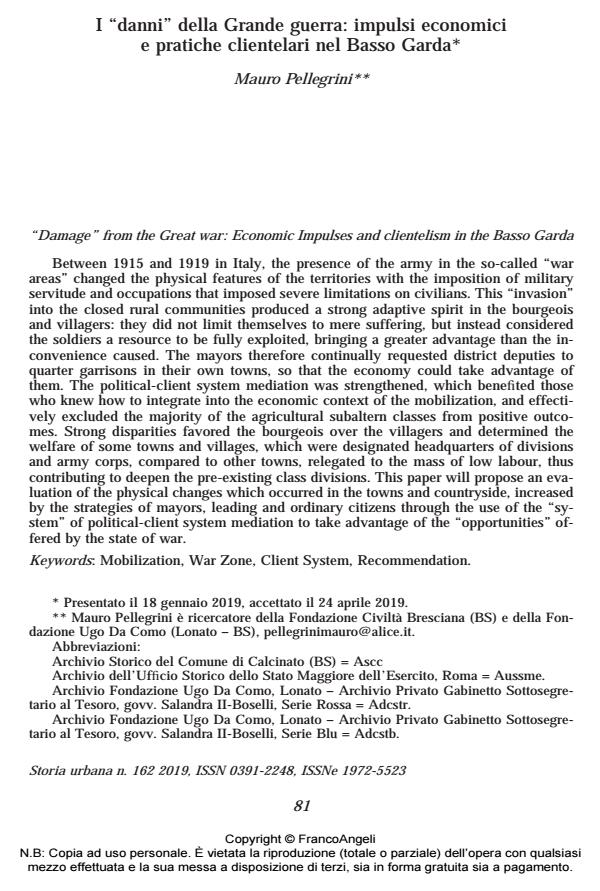"Damage" from the Great war: Economic Impulses and clientelism in the Basso Garda
Journal title STORIA URBANA
Author/s Mauro Pellegrini
Publishing Year 2019 Issue 2019/162 Language Italian
Pages 32 P. 81-112 File size 543 KB
DOI 10.3280/SU2019-162005
DOI is like a bar code for intellectual property: to have more infomation
click here
Below, you can see the article first page
If you want to buy this article in PDF format, you can do it, following the instructions to buy download credits

FrancoAngeli is member of Publishers International Linking Association, Inc (PILA), a not-for-profit association which run the CrossRef service enabling links to and from online scholarly content.
Between 1915 and 1919 in Italy, the presence of the army in the so-called "war areas" changed the physical features of the territories with the imposition of military servitude and occupations that imposed severe limitations on civilians. This "invasion" into the closed rural communities produced a strong adaptive spirit in the bourgeois and villagers: they did not limit themselves to mere suffering, but instead considered the soldiers a resource to be fully exploited, bringing a greater advantage than the inconvenience caused. The mayors therefore continually requested district deputies to quarter garrisons in their own towns, so that the economy could take advantage of them. The political-client system mediation was strengthened, which benefited those who knew how to integrate into the economic context of the mobilization, and effectively excluded the majority of the agricultural subaltern classes from positive outcomes. Strong disparities favored the bourgeois over the villagers and determined the welfare of some towns and villages, which were designated headquarters of divisions and army corps, compared to other towns, relegated to the mass of low labour, thus contributing to deepen the pre-existing class divisions. This paper will propose an evaluation of the physical changes which occurred in the towns and countryside, increased by the strategies of mayors, leading and ordinary citizens through the use of the "system" of political-client system mediation to take advantage of the "opportunities" offered by the state of war.
Keywords: Mobilization, War Zone, Client System, Recommendation.
Mauro Pellegrini, I "danni" della Grande guerra: impulsi economici e pratiche clientelari nel Basso Garda in "STORIA URBANA " 162/2019, pp 81-112, DOI: 10.3280/SU2019-162005